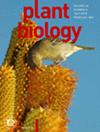Will climate change constrain the altitudinal range of threatened species? Experimental evidence from a biodiversity hotspot
IF 3.6
3区 生物学
Q1 PLANT SCIENCES
引用次数: 0
Abstract
气候变化会限制受威胁物种的高度分布范围吗?来自生物多样性热点地区的实验证据。
生态学和进化论的一个基本目标是解释形成物种丰度和分布范围限制的因素。评估早期生命阶段在不同海拔梯度上的表现,对于了解哪些因素影响了物种的分布范围,以及预测植物物种如何应对气候变化都很有价值。为了实验性地评估一种濒危棕榈(Euterpe edulis)在早期生命阶段是否存在局部适应性,我们在两个海拔高度截然不同的地方相互播种。此外,为了评估种子捕食对 Euterpe edulis 种子萌发和幼苗生长的影响,我们在三个不同海拔高度进行了种子添加实验。我们的研究结果表明,没有证据表明两个E. edulis种群在生命早期阶段有地方适应性。在低海拔地区,我们观察到两个 E. edulis 种群的发芽率和成苗率都较低。在所有海拔高度,排除种子捕食会提高幼苗成活率。种子捕食和干燥的土壤条件分别是限制海拔上限和海拔下限幼苗成活的主要因素。研究地区的气候变化将导致环境条件更加温暖和干燥。E.edulis种群在温暖干燥的条件下缺乏本地适应性,表现较差,再加上海拔上限的种子捕食率较高,可能会导致其海拔分布范围缩小,使这一濒危物种更容易受到气候变化的影响。
本文章由计算机程序翻译,如有差异,请以英文原文为准。
求助全文
约1分钟内获得全文
求助全文
来源期刊

Plant Biology
生物-植物科学
CiteScore
8.20
自引率
2.60%
发文量
109
审稿时长
3 months
期刊介绍:
Plant Biology is an international journal of broad scope bringing together the different subdisciplines, such as physiology, molecular biology, cell biology, development, genetics, systematics, ecology, evolution, ecophysiology, plant-microbe interactions, and mycology.
Plant Biology publishes original problem-oriented full-length research papers, short research papers, and review articles. Discussion of hot topics and provocative opinion articles are published under the heading Acute Views. From a multidisciplinary perspective, Plant Biology will provide a platform for publication, information and debate, encompassing all areas which fall within the scope of plant science.
 求助内容:
求助内容: 应助结果提醒方式:
应助结果提醒方式:


